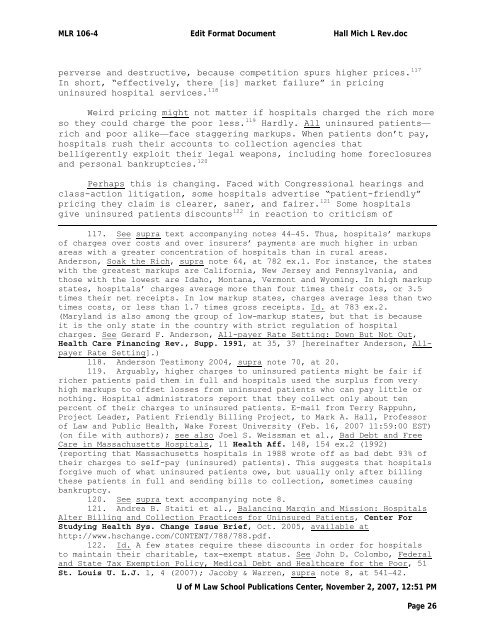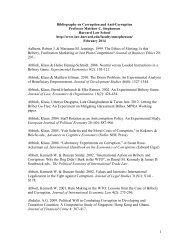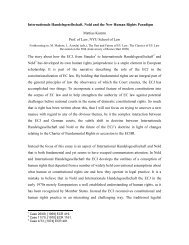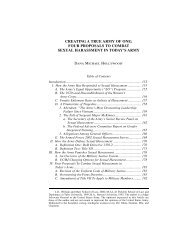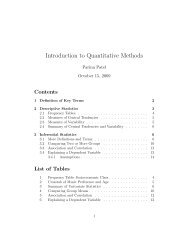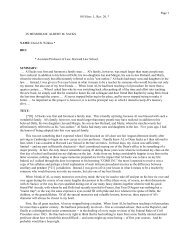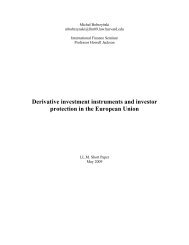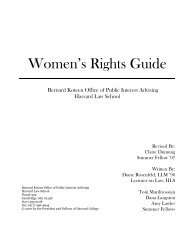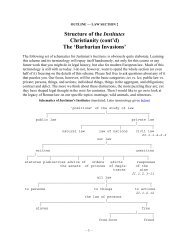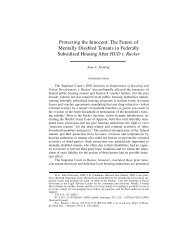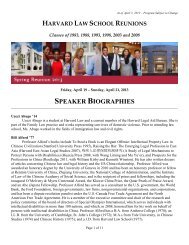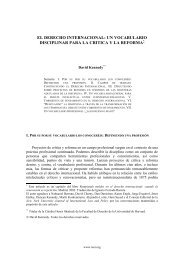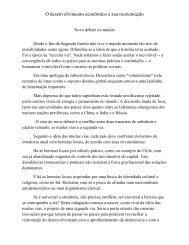Patients as Consumers - Harvard Law School
Patients as Consumers - Harvard Law School
Patients as Consumers - Harvard Law School
You also want an ePaper? Increase the reach of your titles
YUMPU automatically turns print PDFs into web optimized ePapers that Google loves.
MLR 106-4 Edit Format Document Hall Mich L Rev.doc<br />
perverse and destructive, because competition spurs higher prices. 117<br />
In short, “effectively, there [is] market failure” in pricing<br />
uninsured hospital services. 118<br />
Weird pricing might not matter if hospitals charged the rich more<br />
so they could charge the poor less. 119 Hardly. All uninsured patients—<br />
rich and poor alike—face staggering markups. When patients don’t pay,<br />
hospitals rush their accounts to collection agencies that<br />
belligerently exploit their legal weapons, including home foreclosures<br />
and personal bankruptcies. 120<br />
Perhaps this is changing. Faced with Congressional hearings and<br />
cl<strong>as</strong>s-action litigation, some hospitals advertise “patient-friendly”<br />
pricing they claim is clearer, saner, and fairer. 121 Some hospitals<br />
give uninsured patients discounts 122 in reaction to criticism of<br />
117. See supra text accompanying notes 44–45. Thus, hospitals’ markups<br />
of charges over costs and over insurers’ payments are much higher in urban<br />
are<strong>as</strong> with a greater concentration of hospitals than in rural are<strong>as</strong>.<br />
Anderson, Soak the Rich, supra note 64, at 782 ex.1. For instance, the states<br />
with the greatest markups are California, New Jersey and Pennsylvania, and<br />
those with the lowest are Idaho, Montana, Vermont and Wyoming. In high markup<br />
states, hospitals’ charges average more than four times their costs, or 3.5<br />
times their net receipts. In low markup states, charges average less than two<br />
times costs, or less than 1.7 times gross receipts. Id. at 783 ex.2.<br />
(Maryland is also among the group of low-markup states, but that is because<br />
it is the only state in the country with strict regulation of hospital<br />
charges. See Gerard F. Anderson, All-payer Rate Setting: Down But Not Out,<br />
Health Care Financing Rev., Supp. 1991, at 35, 37 [hereinafter Anderson, Allpayer<br />
Rate Setting].)<br />
118. Anderson Testimony 2004, supra note 70, at 20.<br />
119. Arguably, higher charges to uninsured patients might be fair if<br />
richer patients paid them in full and hospitals used the surplus from very<br />
high markups to offset losses from uninsured patients who can pay little or<br />
nothing. Hospital administrators report that they collect only about ten<br />
percent of their charges to uninsured patients. E-mail from Terry Rappuhn,<br />
Project Leader, Patient Friendly Billing Project, to Mark A. Hall, Professor<br />
of <strong>Law</strong> and Public Health, Wake Forest University (Feb. 16, 2007 11:59:00 EST)<br />
(on file with authors); see also Joel S. Weissman et al., Bad Debt and Free<br />
Care in M<strong>as</strong>sachusetts Hospitals, 11 Health Aff. 148, 154 ex.2 (1992)<br />
(reporting that M<strong>as</strong>sachusetts hospitals in 1988 wrote off <strong>as</strong> bad debt 93% of<br />
their charges to self-pay (uninsured) patients). This suggests that hospitals<br />
forgive much of what uninsured patients owe, but usually only after billing<br />
these patients in full and sending bills to collection, sometimes causing<br />
bankruptcy.<br />
120. See supra text accompanying note 8.<br />
121. Andrea B. Staiti et al., Balancing Margin and Mission: Hospitals<br />
Alter Billing and Collection Practices for Uninsured <strong>Patients</strong>, Center For<br />
Studying Health Sys. Change Issue Brief, Oct. 2005, available at<br />
http://www.hschange.com/CONTENT/788/788.pdf.<br />
122. Id. A few states require these discounts in order for hospitals<br />
to maintain their charitable, tax-exempt status. See John D. Colombo, Federal<br />
and State Tax Exemption Policy, Medical Debt and Healthcare for the Poor, 51<br />
St. Louis U. L.J. 1, 4 (2007); Jacoby & Warren, supra note 8, at 541–42.<br />
U of M <strong>Law</strong> <strong>School</strong> Publications Center, November 2, 2007, 12:51 PM<br />
Page 26


